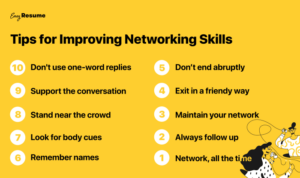Personal Branding Tips: Ready to take your personal brand to the next level? In today’s digital age, standing out is crucial. Let’s dive into some key strategies to help you define and elevate your personal brand.
Introduction to Personal Branding

Personal branding is all about how you present yourself to the world. It’s like your own unique packaging that tells people who you are, what you stand for, and what makes you different from everyone else.
Importance of Personal Branding in Today’s Digital Age, Personal Branding Tips
In today’s digital age, everyone is online, and your personal brand is what sets you apart in a sea of profiles and resumes. It helps you stand out, make a memorable impression, and showcase your skills and expertise to a global audience.
Impact of Personal Branding on Career Growth and Opportunities
- Builds credibility and trust: A strong personal brand can make you more trustworthy in the eyes of employers, clients, and colleagues.
- Attracts opportunities: When you have a clear personal brand, you are more likely to attract the right opportunities that align with your goals and values.
- Boosts visibility: Personal branding can increase your visibility and help you reach a wider audience, leading to more career growth opportunities.
- Differentiates you from the competition: In a competitive job market, a strong personal brand can help you stand out and be remembered by potential employers.
Building Your Personal Brand: Personal Branding Tips
Building a strong personal brand is crucial in today’s competitive world. Here are some tips to help you define your unique value proposition and create a consistent brand image across different platforms:
Defining Your Unique Value Proposition
When it comes to personal branding, it’s essential to identify what sets you apart from others. Your unique value proposition is what differentiates you from the crowd and makes you memorable. To define your unique value proposition, consider your strengths, skills, experiences, and what you can offer that others can’t.
The Importance of Consistency
Consistency is key when it comes to personal branding. Your brand image should be consistent across all platforms, including social media, your website, resume, and any other online presence. Make sure your messaging, visuals, and tone of voice align to create a cohesive brand identity that resonates with your audience.
Strategies for Creating a Strong Brand Image
- Develop a personal brand statement that clearly communicates who you are, what you do, and why you do it.
- Use high-quality visuals that reflect your personal brand, such as a professional headshot and visually appealing graphics.
- Engage with your audience regularly through content creation, social media interactions, and networking opportunities.
- Showcase your expertise by sharing your knowledge and insights in your niche through blogs, podcasts, or speaking engagements.
- Seek feedback from peers, mentors, or industry experts to refine your personal brand and make necessary adjustments.
Online Presence and Personal Branding
Building a strong online presence is crucial when it comes to personal branding in today’s digital age. Social media plays a significant role in shaping how others perceive you, so it’s essential to be intentional with your online activities.
Role of Social Media in Personal Branding
- Engage with your audience: Interact with followers, respond to comments, and share valuable content to showcase your expertise.
- Consistent branding: Maintain a cohesive brand image across all social media platforms by using the same profile picture, bio, and messaging.
- Showcase your personality: Let your authentic self shine through your posts to connect with your audience on a deeper level.
Optimizing Your LinkedIn Profile for Personal Branding
- Professional photo and headline: Use a high-quality professional photo and a compelling headline that highlights your expertise.
- Complete your profile: Fill out all sections of your profile, including work experience, education, skills, and recommendations.
- Create engaging content: Share industry insights, articles, and updates to position yourself as a thought leader in your field.
Managing Your Online Reputation
- Monitor your digital footprint: Regularly Google yourself and set up alerts to stay informed about any mentions of your name online.
- Address negative feedback: Respond professionally to any criticism or negative comments to show that you value feedback and are committed to improvement.
- Build a positive online presence: Share positive stories, testimonials, and achievements to counteract any negative information that may exist online.
Networking and Personal Branding

Networking plays a crucial role in building a strong personal brand. It involves connecting with people who can help you grow professionally, provide opportunities, and increase your visibility in your industry.
Importance of Networking in Personal Branding
- Networking helps you establish meaningful relationships with professionals in your field.
- It allows you to gain insights, knowledge, and advice from experienced individuals.
- Networking can open doors to new career opportunities and collaborations.
- By building a strong network, you can increase your credibility and visibility in your industry.
Strategies for Networking
- Attend industry events, conferences, and seminars to meet new people and expand your network.
- Utilize social media platforms like LinkedIn to connect with professionals and engage in industry-related discussions.
- Join professional organizations and networking groups to meet like-minded individuals.
Leveraging Networking Opportunities
- Follow up with contacts after networking events to maintain relationships and explore potential collaborations.
- Offer to help others in your network by sharing your expertise and resources.
- Be proactive in seeking networking opportunities and stay engaged with your connections.
Personal Branding for Entrepreneurs
Entrepreneurs can leverage personal branding to attract clients and investors by showcasing their expertise, credibility, and unique value proposition. A strong personal brand can help establish trust, differentiate from competitors, and create a loyal following.
Aligning Personal Branding with Business Objectives
It’s crucial for entrepreneurs to align their personal branding efforts with their business objectives to ensure consistency and relevance. Here are some tips to achieve this:
- Identify your target audience: Understand who your ideal clients and investors are to tailor your personal brand messaging accordingly.
- Define your unique selling points: Highlight what sets you apart from others in the industry and how it aligns with your business goals.
- Create a cohesive brand image: Ensure that your personal brand reflects the values, mission, and vision of your business for a unified presence.
- Consistently communicate your brand message: Whether through social media, networking events, or public speaking engagements, make sure your personal brand messaging aligns with your business objectives.
Examples of Successful Entrepreneurs with Strong Personal Brands
Several successful entrepreneurs have effectively built strong personal brands that have contributed to their business success. Some notable examples include:
-
Elon Musk: Known for his innovative thinking and bold vision, Elon Musk has established a strong personal brand that aligns with his companies such as Tesla and SpaceX.
-
Oprah Winfrey: Through her authenticity, empathy, and leadership, Oprah Winfrey has built a personal brand that resonates with her audience and enhances her business ventures.
-
Gary Vaynerchuk: With his no-nonsense approach and focus on hustle, Gary Vaynerchuk has created a personal brand that attracts clients and investors to his marketing and media agency.
Personal Branding for Job Seekers
In today’s competitive job market, personal branding can be a powerful tool for job seekers looking to make a lasting impression on potential employers. By crafting a strong personal brand, job seekers can stand out from the crowd and showcase their unique skills and experiences.
Creating a Professional Online Presence
Building a professional online presence is crucial for job seekers in today’s digital age. Here are some tips to help job seekers create a strong online presence:
- Ensure your LinkedIn profile is up-to-date and showcases your skills and experiences.
- Create a personal website or online portfolio to showcase your work and accomplishments.
- Engage with industry-related content on social media to demonstrate your knowledge and passion for your field.
Using Personal Branding During Job Interviews
Personal branding can also play a key role during job interviews. Here are some tips for job seekers to effectively use personal branding during interviews:
- Clearly communicate your unique value proposition and what sets you apart from other candidates.
- Showcase your personal brand through your clothing, body language, and communication style.
- Provide specific examples of how your personal brand aligns with the company’s values and goals.




